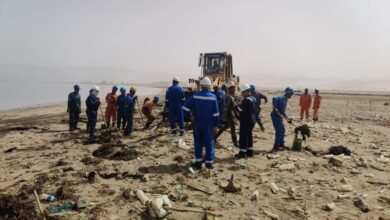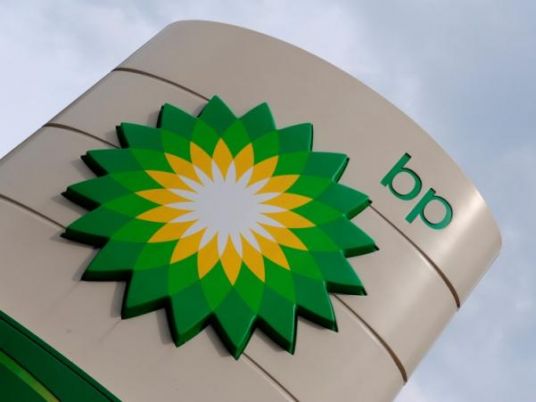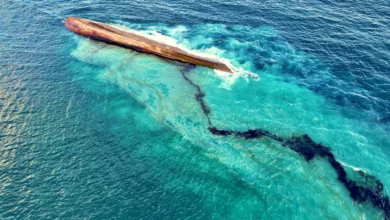Under intense pressure from President Barack Obama, BP Plc agreed on Wednesday to set up a $20 billion fund for claims from its huge Gulf of Mexico oil spill and suspended dividend payments to its shareholders.
The deal handed Obama, who has been criticized for his handling of the 58-day-old disaster, a major victory. It also eased US political pressure on British energy giant BP, whose share price has withered amid investor uncertainty over how much the spill would end up costing the company.
Obama announced the agreement after White House officials held four hours of talks with BP executives, who emerged later to stand in front of the West Wing to offer an apology to the American people for the worst oil spill in US history.
An April 20 explosion on an offshore rig leased by BP killed 11 workers and ruptured a deep-sea well. The ensuing spill has fouled 120 miles of US coastline, imperiled multibillion-dollar fishing and tourism industries and killed birds, sea turtles and dolphins.
While Obama stressed that the agreement would not cap BP’s total liabilities from the spill, Wall Street appeared to cheer the small dose of clarity that the deal provided, driving the company’s share price up 1.5 percent in New York.
Under the agreement, BP committed to pay $20 billion into an independently managed fund over four years, suspend dividend payments for the rest of the year and pay $100 million to workers idled by the six-month moratorium on deep-sea drilling that the Obama administration imposed after the spill.
The $20 billion figure is roughly equal to BP’s average annual profits over the past four years. BP is expected to report net profits of $18.9 billion in 2010, according to Thomson Reuters I/B/E/S consensus estimates.
“We will continue to hold BP and all other responsible parties accountable,” Obama said at the White House. “And I’m absolutely confident BP will be able to meet its obligations to the Gulf Coast and to the American people.”
The fund will be administered by Kenneth Feinberg, the Obama administration official who oversaw compensation for executives at companies that received federal bailout funds.
In a conciliatory statement outside the White House, BP Chairman Carl-Henric Svanberg apologized to the American people. “I do thank you for the patience that you have during this difficult time,” he said.
“I hear comments sometimes that large oil companies are greedy companies who don’t care, but that is not the case in BP, we care about the small people,” Svanberg said.
Svanberg promised to make sure damage claims were handled swiftly and fairly.
Obama had pressed BP to set up a third-party administered fund after hearing first-hand complaints from Gulf Coast residents that BP’s claims process was too long and complicated and that the company was paying out too little money.
With thousands of Gulf Coast commercial fishermen largely idled by the spill, Louisiana shrimper Clifton Bartholomew, 21, wondered whether $20 billion would be enough.
“If you add it all up together, everybody in shrimping, fishing, the whole industry–by the time this is all gone I think they’ll need more than $20 billion,” Bartholomew said.
BP said in a statement it would cut three quarters of dividends, significantly reduce its investment program and sell $10 billion of assets to fund a planned $20 billion fund to pay for the oil spill.
The commitments are harsher penalties than most investors had hoped for. They had not expected BP to be forced to sell assets and cut investment, moves that would curb the company’s future growth.
BP said it would cancel the previously declared first-quarter dividend scheduled for payment on June 21, and said no interim dividends will be declared for the second and third quarters of 2010. The payouts had been expected to be about $2.6 billion per quarter, in line with recent quarters.
‘STRONG AND VIABLE COMPANY’
Obama stressed that BP was “a strong and viable company, and it is in all of our interests that it remain so.”
The oil giant represents a large part of investments in Britain. Obama and British Prime Minister David Cameron talked about the issues around the spill last weekend.
BP’s shares gyrated in volatile New York trading, dropping as much as 5 percent in the morning before swinging back to punch into positive territory after news of the agreement on the fund, known as an escrow account.
“It takes a little bit of pressure off BP,” Iain Armstrong, an oil analyst at brokerage Brewin Dolphin in London, said of the escrow agreement. “If it gets Obama off their back, it can’t be that bad.”
Shares in Anadarko, part owner of the blown-out well, closed down 3.69 percent, and Transocean, which owned the rig that blew up, closed down 3.09 percent in New York.
The agreement could also improve the tenor of BP CEO Tony Hayward’s appearance before a congressional hearing on Thursday. Hayward, the public face of BP’s response to the spill, has been a lightning rod for criticism of the company.
He is still expected to face tough questions about the events leading up to the spill and BP’s clean-up of the mess.
As its executives met with US officials at the White House, BP continued to wrestle with the spill in the Gulf.
It started up a second system to siphon oil from its gushing leak early on Wednesday, a day after a team of US scientists raised their high-end estimate of the amount of crude oil flowing from its well by 50 percent to between 35,000 and 60,000 barrels per day.
The new containment cap system is intended to increase overall collection capacity to 28,000 barrels (1.18 million gallons/4.45 million liters) a day from around 15,000 (630,000 gallons/2.38 million liters) a day now. The company is drilling relief wells that it hopes will definitively halt the spill in August.




